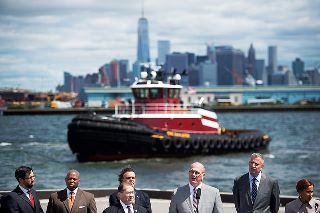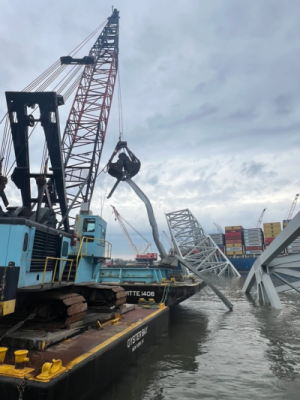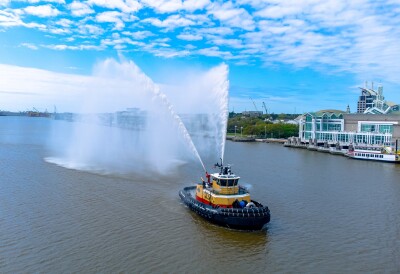Decades after losing its deepwater cargo trade to New Jersey, New York City Mayor Bill de Blasio and other city leaders say they are ready for an aggressive plan to redevelop the South Brooklyn Marine Terminal.
The U.S. Maritime Administration and U.S. Department of Transportation on Monday formally recognized the city-owned South Brooklyn Marine Terminal in Sunset Park, and the nearby Red Hook Container Park as part of the national Marine Highway System. That could put New York in line for federal support to re-establish cargo operations close to the heart of the city.
“This is a big step towards putting our waterfront back to work. Soon, cargo ships that would have docked in New Jersey will be docking here in Brooklyn, bringing good jobs, taking trucks off our streets and helping spur this growing industrial hub,” de Blasio said.
Along with generating new work for the region’s tug and barge fleets, city officials tout the future port’s potential for creating hundreds of well-paying union jobs.
New York’s deep and storied merchant shipping trade began to erode in the 1950s and ‘60s, as passenger liner service to Europe was replaced by airline travel, and shippers began migrating to Port Newark on New Jersey’s west side of the harbor, with its easier highway and rail access.
Now the city’s planning for the Brooklyn terminals actively involves those New Jersey port users, to envision an integrated cross-harbor transportation system that can deliver goods directly into the city by water. Within five years, use of the Red Hook terminal alone could eliminate 275,000 truck trips and their diesel emissions from city neighborhoods, de Blasio said.
That plan for a New York Harbor Container and Trailer Barge Service shows “the collaborative atmosphere prevalent in the Port of New York and New Jersey,” said John Nardi, president of the New York Shipping Association. One barge of containerized cargo crossing the harbor can eliminate 250 trucks from city streets, and the towboats emit 20 times less nitrogen oxide and sulfur dioxide per ton of cargo moved compared to trucking, according to the mayor’s office.
Cross-harbor barge movements would help ease congestion on the region’s bridges and tunnels too. Longer-term rail line improvements could give Brooklyn some of the intermodal advantage of the New Jersey ports, but developing those links will take years.
The plan stalled last winter amid disputes between the de Blasio administration and Brooklyn leaders, who wanted more community control and assurances that other private redevelopment near the waterfront would not hamper port development and its local jobs.





